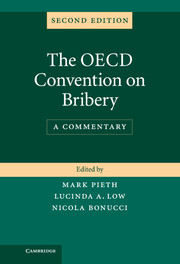Book contents
- Frontmatter
- Contents
- Notes on Contributors
- Foreword
- Acknowledgements
- Abbreviations
- Part I Introduction
- Part II Commentary
- Article 1 The Offence of Bribery of Foreign Public Officials
- Article 2 The Responsibility of Legal Persons
- Article 3 Sanctions
- Article 3(3) Seizure and Confiscation
- Article 4 Jurisdiction
- Article 5 Enforcement
- Article 6 Statute of Limitations
- Article 7 Money Laundering
- Article 8 Accounting
- Articles 9–11 International Co-operation
- Article 12 Monitoring and Follow-up
- Articles 13–17 Final Provisions
- Part III The Convention in Practice
- Annex OECD Documents
- Consolidated Bibliography
- Index
- References
Article 7 - Money Laundering
from Part II - Commentary
Published online by Cambridge University Press: 05 March 2015
- Frontmatter
- Contents
- Notes on Contributors
- Foreword
- Acknowledgements
- Abbreviations
- Part I Introduction
- Part II Commentary
- Article 1 The Offence of Bribery of Foreign Public Officials
- Article 2 The Responsibility of Legal Persons
- Article 3 Sanctions
- Article 3(3) Seizure and Confiscation
- Article 4 Jurisdiction
- Article 5 Enforcement
- Article 6 Statute of Limitations
- Article 7 Money Laundering
- Article 8 Accounting
- Articles 9–11 International Co-operation
- Article 12 Monitoring and Follow-up
- Articles 13–17 Final Provisions
- Part III The Convention in Practice
- Annex OECD Documents
- Consolidated Bibliography
- Index
- References
Summary
Money Laundering
Each Party which has made bribery of its own public official a predicate offence for the purpose of the application of its money laundering legislation shall do so on the same terms for the bribery of a foreign public official, without regard to the place where the bribery occurred.
Official Commentaries
Article 7 – Money Laundering
In Article 7, ‘bribery of its own public official’ is intended broadly, so that bribery of a foreign public official is to be made a predicate offence for money laundering legislation on the same terms, when a Party has made either active or passive bribery of its own public official such an offence. When a Party has made only passive bribery of its own public officials a predicate offence for money laundering purposes, this article requires that the laundering of the bribe payment be subject to money laundering legislation.
Recommendation 2009
General
[THE COUNCIL] RECOMMENDS that each Member country take concrete and meaningful steps in conformity with its jurisdictional and other basic legal principles to examine or further examine the following areas:
iv) laws and regulations on banks and other financial institutions to ensure that adequate records would be kept and made available for inspection and investigation.
- Type
- Chapter
- Information
- The OECD Convention on BriberyA Commentary, pp. 422 - 446Publisher: Cambridge University PressPrint publication year: 2013

